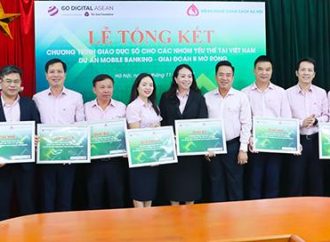Address Address IFAD-APRACA FinPower Forum-Consultation on Rural Financial Innovations and Emerging Issues Dr. Ganesh Thapa, Regional Economist, Asia and the Pacific Division, IFAD, Mr. Man-Ho So, Deputy Regional Representative, FAO Regional Office for Asia and the Pacific,Mr. Luck Wajananawat, President of BAAC,Mr. Won-Sik Noh, APRACA Secretary General, Representatives of APRACA member institutions and development partners Distinguished guests,
Address Address
IFAD-APRACA FinPower Forum-Consultation on Rural Financial Innovations and Emerging Issues
Dr. Ganesh Thapa, Regional Economist, Asia and the Pacific Division, IFAD, Mr. Man-Ho So, Deputy Regional Representative, FAO Regional Office for Asia and the Pacific,Mr. Luck Wajananawat, President of BAAC,Mr. Won-Sik Noh, APRACA Secretary General,
Representatives of APRACA member institutions and development partners
Distinguished guests, Ladies and Gentlemen,
Good morning!
It is my great pleasure and privilege to be here with all of you today. Before starting, I would like to express my deep sympathy to the people of Thailand who have struggled in such an unprecedented flooding disaster. We understand the feeling and difficulties of the victim who lost their properties, family members and other valuable stuffs in this catastrophic damage. We would like to share a few words to console their heart in the name of friendship and one family. Also, my special thanks and appreciation go to APRACA secretariat for their tireless efforts in preparing this important forum during this difficult time.
The today’s consultation forum laid on the topic of: “Rural financial innovations, emerging issues and challenges”. And, the venue of this forum is meant for our memory to an extend that the emerging issues and challenges for microfinance sector is not only happened because of internal factors, but such a moment of natural catastrophe may also impact the microfinance’s operations. As we realized that the flooding disaster in Thailand and other surrounding countries in the region have also posted a huge challenge for a number of people. And, the most impacted ones are those who have less recovery capacity. In this respect, microfinance community may also need to further broaden its outreach to address this increasing issue.
Distinguished guests, ladies and gentlemen,
The presence of Dr. Ganesh Thapa, Regional Economist of Asia Pacific Division, IFAD, Dr. Geetha Nagarajan, Associate Director, IRIS Center, University of Maryland, representatives of our members and our strategic partners as well as a host of other eminent speakers points to the collaboration and cooperation among the key rural financial actors in our region. IFAD has a long collaboration with APRACA under the FinPower Programme and I feel that it would be in our mutual best interests to discuss possibilities for continuing collaboration.
On behalf of the National Bank of Cambodia, who is a current vice-chair of APRACA, I would like to begin by expressing my appreciation to the today’s regional forum, dedicated to the final review of the IFAD-APRACA FinPower Program. The meeting provides a very important review and preparing stage for the next phase of the FinPower program, as I may call. As a matter of fact, the program has significantly been contributive to the microfinance community in various forms. Since the program has been outreached over the Asian Pacific countries, Cambodia has also benefited. I believe today’s forum will allow us to openly bring up, share, and comment on the previous program activities in order for further calibrating the next phase of the program. Moreover, the new program will not only bring new focused areas, but also further alter the program delivery methods that will be more effective and efficient.
Distinguished guests, ladies and gentlemen,
Being one of the APRACA members, I would like to take this opportunity to appreciate the APRACA and its continuous projects to support the microfinance development. To me, the impact has not only benefited the members, but also, the community as a whole. This has been evident by today’s forum that we are here to review the FinPower Program, which mainly has been really contributive to the development of rural financial sector in the region and beyond. Furthermore, being one of the program beneficiaries, I would like to share with you our learning experiences and achievements derived from the program implementation. Firstly, the FinPower program has really been supportive in such a way that it helped to create a platform where the microfinance stakeholders, ranging from regulatory authority, microfinance institutions, development and financial agencies and the clients, have been voiced and shared their experienced among each other. This was really fruitful as there were all parties involved and raised their concerns whereby the solutions were sought. Importantly, the discussion was not only helpful in resolving existing issues but also in addressing new ideas and creative ways of dealing and coping with the issues. This has been really rewarding for the members as well as the participants because they could generate better ideas and came up with new development.
Moreover, the exposure and study visit have also been found useful for knowledge sharing among the members and key successors. This has brought up innovation in which the successful lesson can be replicated in different places with a new application and minimal risk exposure. That is, the program has been a promotional tool for the innovation and making the best experience valuable. In addition, the policy dialogues have also been important during the program implementation because it also helped to advocate and enhance supports among policy makers. This could help getting more consensus and comprehensive directions for the practitioners in pursuit of heading cohesively to the same direction.
Distinguished guests, ladies and gentlemen,
Allow me take this opportunity to touch a little bit on Cambodian microfinance development. In fact, most of Cambodian microfinance institutions were born from non-governmental organizations and their transformation and integration into formal financial system were really successful. The contributive factors have been the supportive effort of the government and various authorities as they understand the significant role of microfinance in rural and economic development for the country. Also, the accommodated regulatory framework has been conducive for the microfinance institutions to brainwash their NGOs mindset and operations to the ones that are more commercialized and focused on self sustainability. As a regulatory and supervisory authority, the National Bank of Cambodia has always been supportive to the growth and innovation of microfinance sector. By introducing our regulatory and supervisory framework, microfinance institutions were not only able to strengthen their institutional capacity, but also enhance their outreach and ensure the public and foreign funders’ confidence. This has allowed microfinance institutions to better serve the clients in rural areas and also to provide a number of products to meet clients’ demands.
With a proven record and maturity of Cambodian microfinance institutions, the National Bank of Cambodia issued a license that allows eligible microfinance institutions to mobilize public deposit. This new license window has been issued along with proper care of additional prudential regulations. Also, the supervisors have regularly performed their off and on-site inspection in order to ensure sound and efficient operations of microfinance institutions. That is, the public money is properly managed by microfinance deposit taking institutions.
In view of diversifying products and services, microfinance institutions have spent their best effort to design products and services than can better satisfying the clients’ needs in term of faster financial access, simpler products and services and importantly cheaper costs. In practice, some Cambodian MFIs have served as micro-insurance agents and payment outlets for mobile phone payment services. This has helped the clients whom microfinance institutions are their front door to gain more benefit. Although the services are at a preliminary stage, the National Bank of Cambodia does not restrict them from servicing the clients. However, the MFIs need to strengthen and calibrate the services in term of simplicity, better technical functionality, more accessibility, and so on. At the same time, the clients are also at the stage to learn and gain better understanding about advantages of service utilization whereby the clients’ financial literacy should go hand in hand with this development.
I do believe that some countries still leave microfinance sector unregulated even though its operations have been increasingly important. By regulating microfinance sector, it is not a threat to their growth. However, the comprehensive and supportive regulatory framework is more favorable to their growth. As a regulator, there is an important need to understand their development pace, growing needs, and their capacity in fulfilling the regulatory requirements. Indeed, the Cambodian regulations are more on a gradual development, meaning, the regulators strengthen or tighten the regulatory requirements as the microfinance institutions are getting matured. What’s more, the supervisory capacity is really important while the sector is supervised. Also, the public and government supports are inevitable. These supportive factors require a good and ongoing care in pursuit of sustaining and stabilizing the sectoral growth.
Distinguished guests, ladies and gentlemen,
To summarize, I would like to express my gratitude to the International Fund for Agricultural Development (IFAD) that has been technically and financially supportive to the existence of the FinPower Program. The program outcomes have been really fruitful and beneficial to the APRACA member countries as well as the microfinance community as a whole. To review the program implementation, it is necessary to factor the previous experiences and further prospect of microfinance development. This allows us to synthesize for the best and applicable solutions that can work to prosper the benefit of microfinance for the poor. We do understand that new challenges have continuously emerged while the outstanding issues have not really been resolved. This requires an actively collaborative effort and innovative solutions that can help dealing with potential risks and emerging challenges in the microfinance sector. Furthermore, the need to put the poor clients upfront is really necessary in order to have them benefit from the financial inclusion. That is, the financial literacy and clients’ protection are needy. On top of this, we have learnt that the sector always want to try and innovate new things while the potential risks are also coming along; that is, the institutional capacity needs to be strengthened and well managed in order to minimize the risk exposure. Importantly, the regulatory and supervisory capacity also requires ongoing training in order to support the growing microfinance sector.
Last but not the least; I would like to once again extend my gratitude to the APRACA secretariat, BAAC, and IFAD for their co-hosting this important consultation forum. I trust the participants are taking this opportunity to raise and share experiences attained during the implementation of the FinPower Program. On behalf of the National Bank of Cambodia and in my capacity as a vice-chairman of APRACA, I would like to express further support to the next generation of the FinPower Program. Also, as Cambodia will be hosting 18th APRACA General Assembly and a conference, I would like to take this opportunity to invite all APRACA members and partners to join this coming APRACA’s event that will be held in a historical province of Cambodia from 30th May to 01st June, 2012. I believe your participation will help to further strengthening the role of APRACA in regional microfinance development and beyond. To this end, I would like to wish distinguished guests, ladies and gentlemen success in all of your endeavors.
Thank you.






